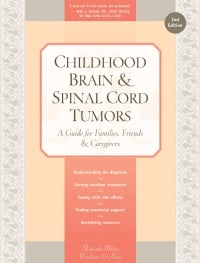Childhood Brain and Spinal Cord Tumors
Possible short-term side effects
Generally, radiation therapy given to children with brain and spinal cord tumors takes place over 4 to 6 weeks. If side effects occur, it is often hard to differentiate those caused by radiation from those caused by the chemotherapy, which is sometimes given at the same time. The severity of the side effects depends upon the sensitivity and size of the area being irradiated. The radiation oncologist is familiar with all possible side effects and is responsible for their treatment.
The side effects Sam experienced from the radiation were typical: hair loss, sunburned skin in the radiated area, irritability, and headaches. Eventually, he started on Decadron® to reduce the internal brain swelling. The side effects of this were markedly increased appetite, mood swings, and irritability. A 3 year old on Decadron® is no picnic! There were many days that all I did was prepare and serve food! On those days I was too worn out to worry.
Possible short-term side effects include the following:
- Loss of appetite
Calories are most important; nutrition can come after treatment. We use whole milk, and put butter on everything: Ethan would eat any time, anything. When Ethan completely lost his appetite during radiation, we used Megase®, a prescription appetite stimulant. It has fairly few side effects and did seem to work for him.
- Nausea and vomiting
About a month after radiation was over for my residual pilocytic astrocytoma, I started experiencing all my side effects. I started having problems with my stomach, and was vomiting every morning. I also had balance problems, headaches, cold chills, and had problems with my shunt. I am still experiencing side effects 6 months later. Radiation did stop the growth of my brain tumor.
- Ear, nose, or throat problems
- Mouth and throat sores
There are several concoctions that radiation oncologists prescribe, sometimes called “Miracle Mouthwash,” that often work wonders for mouth and throat sores.
- Fatigue
- Reddened, itchy, or peeling skin
Where the beams entered at two places, his scalp was burned like a sunburn, and aloe vera gel helped to keep that soft.

During radiation I was told to use baby shampoo, not to use a hair dryer, and was given samples of a cream for my scalp called Aquaphor®.
- Hair loss (sometimes permanent)
My son, Dan, experienced really no side effects for the first 3 weeks of radiation to treat anaplastic astrocytoma. Then, at the beginning of the fourth week, his hair began to fall out in quite big clumps. By the end of radiation, he had no hair on his head except for a small ball-shaped spot on top, and a sharp line between his ears and below to his neck. Now, 14 months later, he has all of his hair back except in two places, the two spots where the beams entered his head. The exit spots have all filled in nicely, just the two entrance spots remain. One is very bald while the other has a thin fine film of hair. The rest is long and black and curly again. The docs have told Dan that if the hair hasn’t come back by now, it probably won’t. But Dan is handling it. Hats are still cool. And he doesn’t really care what people think.
- Low blood counts
- Changes in taste and smell (sometimes occurring during treatment sessions)
- Increased or decreased saliva or dry mouth (ask your physician about saliva substitutes such as Moi-Stir® or Salivant®)
My daughter Mandy (age 4) had a problem with thick saliva while she was being treated. We started to give her about 200 ml of extra water each day through her G-tube. This seemed to help although she would still have the problem some days, just not as much.
For additional methods of coping with many of the above side effects, see Chapter 12, Common Side Effects of Chemotherapy.
Somnolence syndrome is uniquely associated with cranial radiation and is characterized by drowsiness, prolonged periods of sleep (up to 20 hours a day), low-grade fever, headaches, nausea, vomiting, irritability, difficulty swallowing, and difficulty speaking. It may occur during radiation or as late as 12 weeks after radiation treatment ends; it can last from a few days to several weeks.
Nine weeks after ending her cranial radiation, my daughter started complaining of severe headaches. She would hold her head and just sob with pain. She also vomited several times. Then she became very sleepy, and dozed on the couch most of the day. She developed a low fever and choked when she tried to swallow liquids or solid food. This lasted for about a week.

Stephan (8 years old) had no side effects from the cranial and spinal radiation other than sleepiness, but he was very affected by it. First, he just started taking naps and generally slowing down. Then the naps got longer, and he was awake less. Finally, he only woke up to eat. Luckily, that part coincided with Christmas vacation so he didn’t miss much school. Altogether, it lasted about 6 weeks.
Table of Contents
All Guides- Introduction
- 1. Diagnosis
- 2. The Brain and Spinal Cord
- 3. Types of Tumors
- 4. Telling Your Child and Others
- 5. Choosing a Treatment
- 6. Coping with Procedures
- 7. Forming a Partnership with the Treatment Team
- 8. Hospitalization
- 9. Venous Catheters
- 10. Surgery
- 11. Chemotherapy
- 12. Common Side Effects of Chemotherapy
- 13. Radiation Therapy
- 14. Peripheral Blood Stem Cell Transplantation
- 15. Siblings
- 16. Family and Friends
- 17. Communication and Behavior
- 18. School
- 19. Sources of Support
- 20. Nutrition
- 21. Medical and Financial Record-keeping
- 22. End of Treatment and Beyond
- 23. Recurrence
- 24. Death and Bereavement
- 25. Looking Forward
- Appendix A. Blood Tests and What They Mean
- Appendix C. Books and Websites

